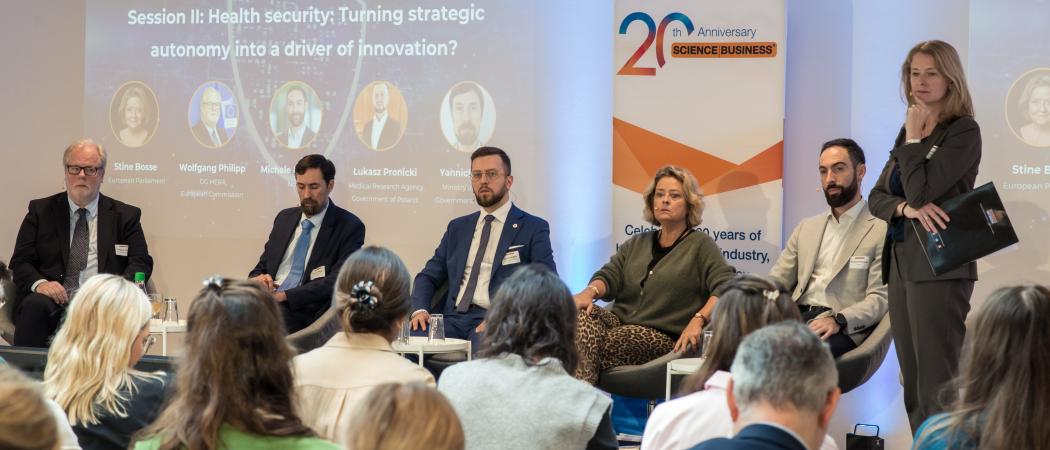To strengthen its health R&D pipelines and prepare for the next health crisis, Europe needs to balance security concerns with greater industrial competitiveness

From left to right: Wolfgang Philipp, Principal Adviser and Chief Science Officer, DG HERA, European Commission, Yannick Morel, Project Director for Stockpiling Strategy, Directorate General of Health, Ministry of Health, Government of France, Łukasz Pronicki, Head, Sponsor Support Center, Medical Research Agency, Government of Poland, Stine Bosse, Member, European Parliament, Michele Mestrinaro, Global Head, Policy and Growth, Novartis, and Maryline Fiaschi, CEO, Science|Business
As the COVID-19 pandemic clearly demonstrated, health is an integral part of Europe’s security. That principle underpinned a recent expert panel discussion, organised by Science|Business and Novartis, which debated how Europe can innovate to achieve greater strategic autonomy.
Health plays “a crucial role in security and defence of our nations”, stated Łukasz Pronicki, head of the sponsor support centre, Medical Research Agency, Government of Poland, especially as health crises can arise from both natural and manmade causes. “We need to invest in our research and development facilities, support industries and build preparedness for the upcoming crisis,” he added during the discussion, which was part of a S|B defence and security R&D conference in Brussels on 17th of October.
With war at Europe’s doorstep and other geopolitical tensions worldwide, the next period of EU politics and policymaking will be dominated by security issues, the panel noted. “If we think back to the COVID-19 situation, nothing felt secure, and we only succeeded because we were working together,” said Stine Bosse, a Member of the European Parliament. “We need strong industries, and we need access to medicines to be at the top of our agendas.”
Getting ahead of a future crisis
Stockpiling is one key measure to building preparedness, contended Yannick Morel, project director for stockpiling strategy, Directorate General of Health, Ministry of Health, French Government. “Health security has common features with military security. Even if a country isn’t currently at war, they stockpile weapons and ammunition.”
According to Morel, new “insurance countermeasures” need to be developed. This is particularly true for so called niche products, meaning medical countermeasures that are currently not needed, but might become vital in the future, as was the case with COVID-19.
This poses a challenge for industry, however, as there isn’t a market for producing medicines that might be used in case of crisis. Moreover, pharmaceutical companies note that innovative and lifesaving therapies, including gene, radioligand or other personalised medicines, have novel manufacturing and supply requirements that make them difficult to stockpile. Rather than stockpiling, the industry would benefit from more competitive R&D ecosystems and resilient supply chains, suggested Michele Mestrinaro, global head, policy and growth, Novartis.
“If we manage to come up with a medicine that works, we need a reasonable assurance that there will be a market for it,” Mestrinaro noted, as he explained the drivers behind the R&D investments of Novartis. “In many cases, even if there is a scientific understanding and technical feasibility for producing a new medicine, we lack this assurance.”
The Novartis representative also pointed out that other geographies have taken dramatically different approaches to this challenge. “In the U.S., we have seen a tendency and willingness to provide a market at risk. This is very different from developments in Europe where the focus has been on trying to get the same result for less rather than maintaining the investment to be more competitive.”
As a result, the competitiveness of Europe has been reduced, added Mestrinaro. “Europe has fallen behind in the influence on what is developed.”
There is a market problem when it comes to niche products and it needs to be addressed, agreed Morel. Nevertheless, in order to be prepared for the next health threat, it’s necessary to have a “specific set of tools controlled by the Union”, he added. This includes stockpiling, but also other tools, such as reservation of production capacities.
Boosting investment in innovation
Both approaches should be combined, concluded Pronicki. “Stockpiling can help us prepare for what we know, but we also need to build readiness and create new tools to develop medicines that are needed in case of crisis. We are lacking the ability to start a quick production of an important pharmaceutical ingredient or other substances.”
The difficulty lies in striking the right balance between stockpiling and investment in the ecosystem to produce what might be needed in the future.
“We believe that stockpiling has a place because it buys a certain amount of time, but we don’t have clarity on what this time would be used for,” added Mestrinaro of Novartis. “We should turn our attention to competitiveness so that we accelerate innovation when needed.”
This opinion was echoed by Wolfgang Philipp, principal adviser and chief science officer, DG HERA, European Commission, who pointed out that, while Europe is among the leading continents in many areas, its “problem starts with translational research and development”. Calling on Europe to focus on competitiveness, he added: “There are ways to incentivise translational research and bring capital to companies to develop products in Europe.”
MEP Bosse reinforced that point. “We have the right competences in Europe, but we don’t transfer them into businesses,” she stated. “It dies with ideas that are brilliant. We need to become investable. This is about competition and where we stand globally, so that we never face a situation where we lack. That is security for citizens.”





 A unique international forum for public research organisations and companies to connect their external engagement with strategic interests around their R&D system.
A unique international forum for public research organisations and companies to connect their external engagement with strategic interests around their R&D system.